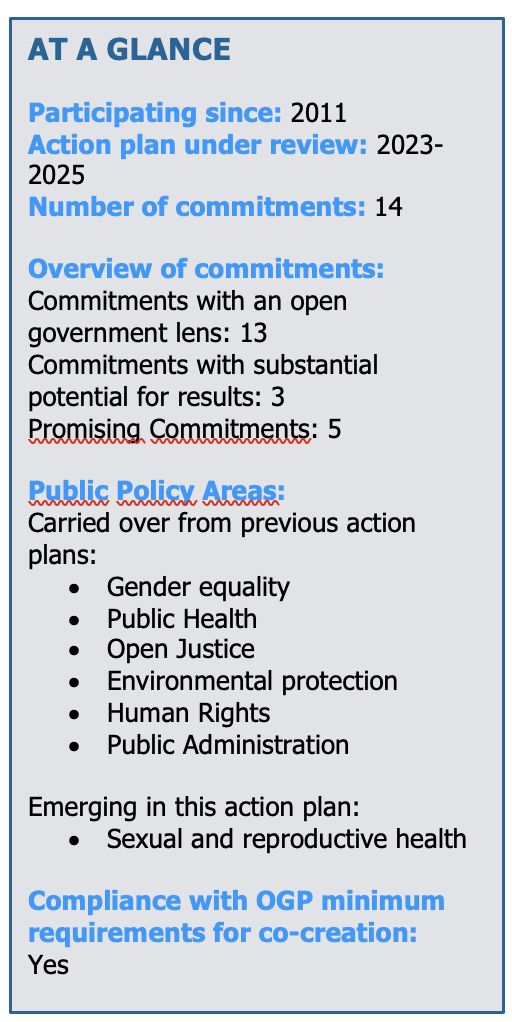Honduras Action Plan Review 2023-2025
- Action Plan: Honduras Action Plan 2023-2025
- Dates Under Review: 2023-2025
- Report Publication Year: 2024
Honduras’ Action PlanAction plans are at the core of a government’s participation in OGP. They are the product of a co-creation process in which government and civil society jointly develop commitments to open governmen... Review 2023-2025 identified 13 out of 14 commitments with an open government perspective and five promising commitments. The review highlights the extensive consultation process developed for the creation of the plan in the country’s 18 departments, as well as the incorporation of sexual and reproductive health as a new area of public policy. As the main challenges, the review identifies the opportunity to improve the design of commitmentOGP commitments are promises for reform co-created by governments and civil society and submitted as part of an action plan. Commitments typically include a description of the problem, concrete action... milestones with a results-oriented perspective and the need to define the resources necessary for the implementation of each initiative.
 Honduras’ 2023-2025 action plan comprises 14 commitments that are distributed across at least seven public policy areas. It has 13 commitments with an open government perspective and 13 with modest or substantial potential to obtain results. The plan also takes up at least six areas incorporated in the previous action plan.
Honduras’ 2023-2025 action plan comprises 14 commitments that are distributed across at least seven public policy areas. It has 13 commitments with an open government perspective and 13 with modest or substantial potential to obtain results. The plan also takes up at least six areas incorporated in the previous action plan.
Honduras’ 2023-2025 action plan comprises 14 commitments distributed across at least seven public policy areas. It has 13 commitments with an open government perspective and 13 with modest or substantial potential to obtain results. The plan also resumes at least six areas included in the previous action plan.
The plan’s co-creation took place in a post-electoral context, after the general electionsImproving transparency in elections and maintaining the independence of electoral commissions is vital for promoting trust in the electoral system, preventing electoral fraud, and upholding the democr... More in November 2021, where the representatives of the executive and legislative branches were elected, in addition to 298 mayors at the municipal level. Also, Hondurans elected the first woman to serve as president of the Republic of Honduras
One of the strengths of the plan is the extensive consultation process developed for its formulation, after having faced the consequences of the COVID-19 pandemic at the government level and the general elections.
The Government of Honduras convened at least 60 civil society organizations to form the 2022-2024 Technical Monitoring Table, which consisted of eight proprietary or right-holder organizations and eight substitutes representing several civil society sectors, the private sector, and the academy. Professional unions, women’s organizations, organizations of indigenous and Afro-descendant peoples, and organized workers and farmers are among the organizations that make up the Table. From the public sector, five public institutions from the three branches of the State participate. The Table works with an advisory team consisting of two public institutions and two civil society organizations all of which have previously worked with OGP in Honduras[1].
Concerning the plan’s deficiencies, there are still opportunities for improvement in the design of commitment milestones. At least one commitment does not show a clear relationship with OGP values, and others show a greater expected scope than the action plan duration, which could jeopardize their prospect of compliance by the end of the plan. Although the level of ambition has remained similar to the previous plan, it does not identify specific public resources- sources of financing – for implementation. Representatives of the Secretariat of Transparency and Fight against Corruption (STLCC, per its acronym in Spanish) [2] warn about the importance of ensuring yearly funding so that commitment compliance is not compromised.
Regarding the development of the action plan, civil society organizations have a positive opinion about the awareness-raising, consultation, and results socialization processes that the Government conducted at the national level[3]. It was the first time Honduras’ 18 departments were visited to conduct consultations regarding OGP[4]. Likewise, they agree on the list of commitments identified as promising (Promoting Judicial Openness to strengthen interest in JusticeTo address barriers that prevent citizens from having their justice needs met, OGP participating governments are working to expand transparency, accountability, and inclusion into all systems of justi... in Defense of the Rights of the Population, Application of the Principle of Parity in the public sector, and Access to information on sexual health and reproductive in Honduras), to the extent that they seek to innovate in critical public policy areas for the country, present substantial challenges for their implementation, but also offer promising results if fulfilled.
[1] Government of Honduras (2023). “Technical Monitoring Table of the Open Government Partnership Honduras (MTS-AGAH 2022-2024)”. Available here: https://agah.stlcc.gob.hn/mts-agah-2022-2024/
[2] The IRM researcher held an interview with three representatives of the Ministry of TransparencyAccording to OGP’s Articles of Governance, transparency occurs when “government-held information (including on activities and decisions) is open, comprehensive, timely, freely available to the pub... More and Fight against Corruption on September 1, 2023.
[3] Interview held with representatives of the Central American Technological University (UNITEC, per its acronym in Spanish) and the Center for Research and Promotion of Human RightsAn essential part of open government includes protecting the sacred freedoms and rights of all citizens, including the most vulnerable groups, and holding those who violate human rights accountable. T... (CIPRODEH, per its acronym in Spanish)
[4] Government of Honduras (2023). “Scheduling of the Conferences in the PAEAH co-creation process. Available here: https://agah.stlcc.gob.hn/calendarizacion-de-las-jornadas-de-cocreacion/

Leave a Reply